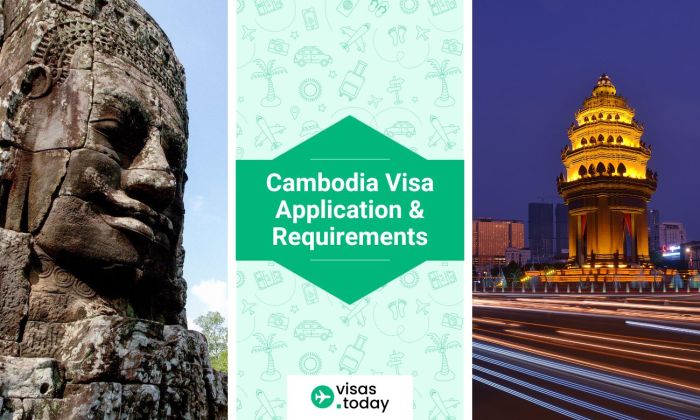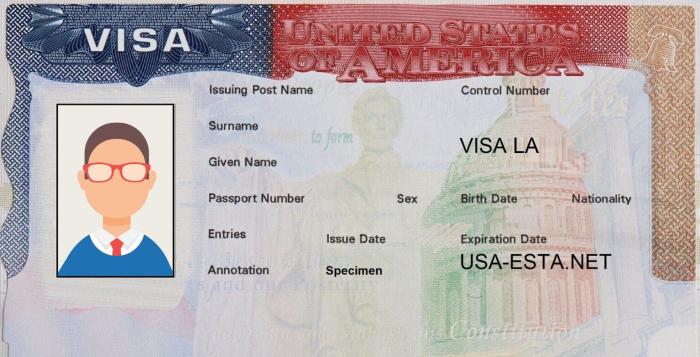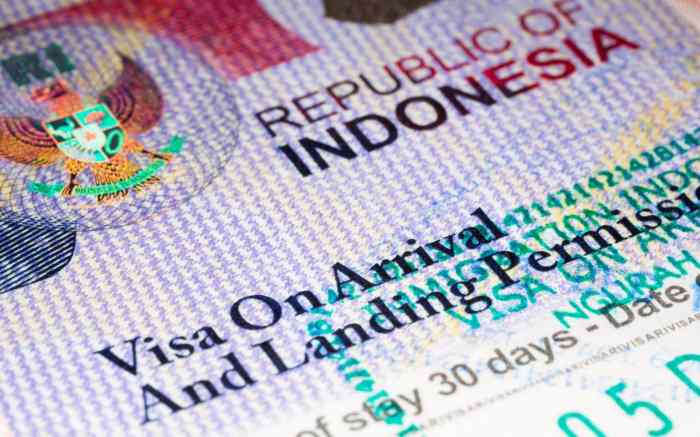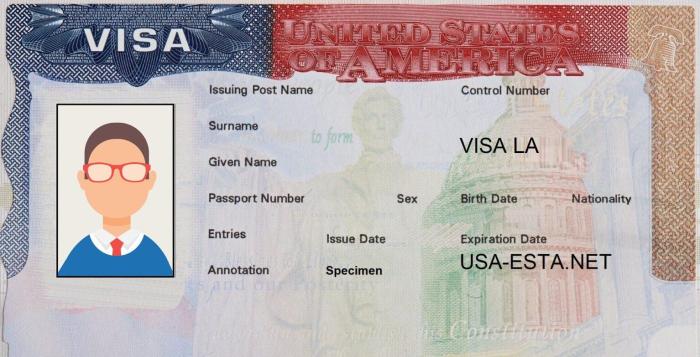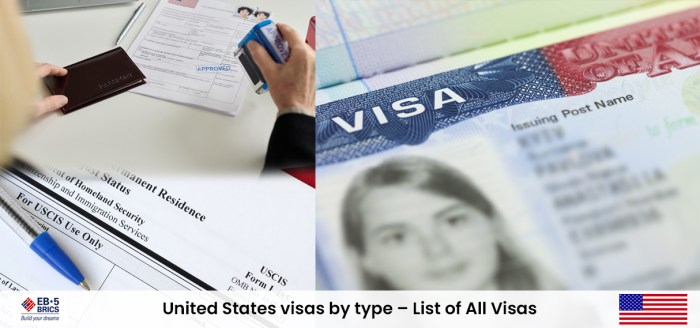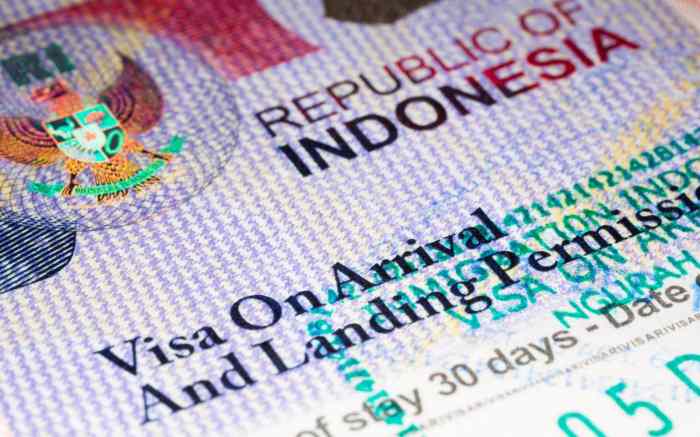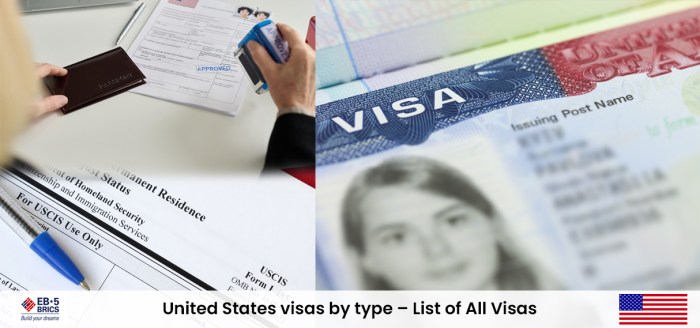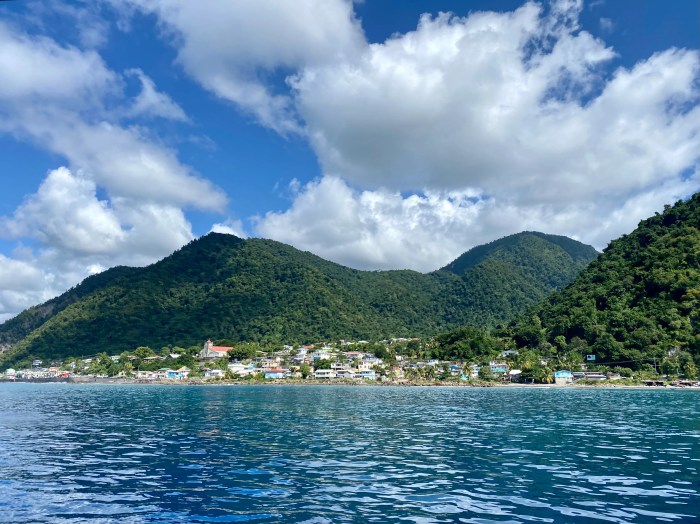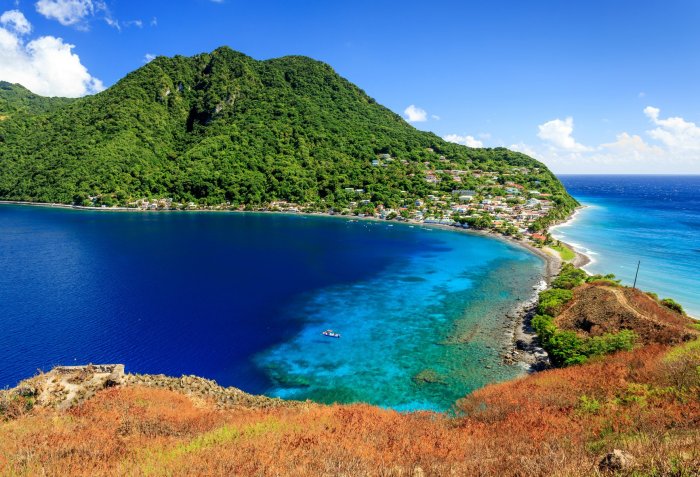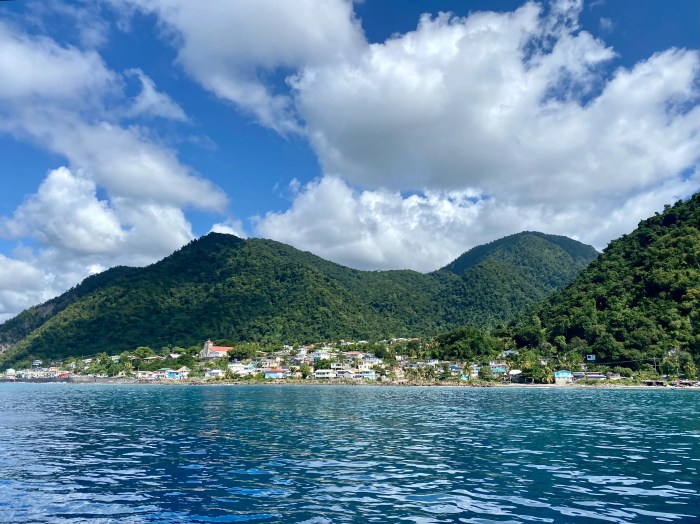Visa requirements for Cambodia are a crucial aspect of planning a trip to this fascinating Southeast Asian country. This comprehensive guide delves into the specifics, covering various visa types, document needs, application procedures, and more. Whether you’re a tourist, business traveler, or worker, understanding these requirements is essential for a smooth and hassle-free experience.
We’ll explore the nuances of different visa categories, from tourist visas to work permits, providing a clear overview of the eligibility criteria, duration limitations, and application processes. This information will empower you to make informed decisions and navigate the Cambodian visa landscape confidently.
Introduction to Cambodian Visa Requirements
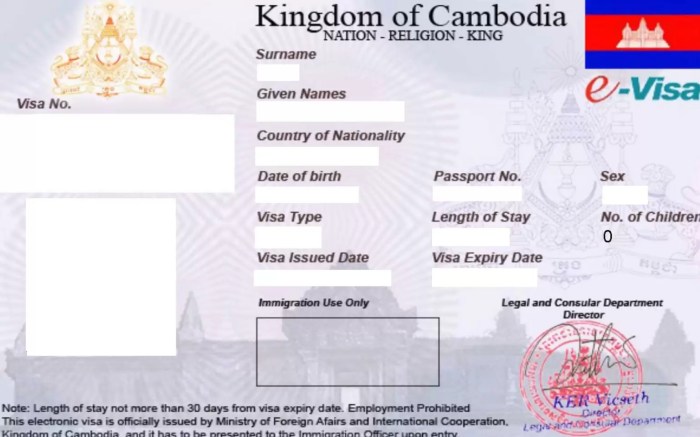
Cambodia welcomes visitors from around the world, but navigating visa requirements can be a bit tricky. Understanding the different visa types and their specific conditions is crucial for a smooth trip. This guide will provide a clear overview of the various visa options available and the key considerations for each.
Types of Cambodian Visas
Different visa types cater to various purposes and durations of stay. These include tourist visas, business visas, and work visas, each with its own set of rules and procedures. A comprehensive understanding of these distinctions ensures you apply for the correct visa, avoiding delays or complications.
| Visa Type | Purpose | Duration | Application Process |
|---|---|---|---|
| Tourist Visa | Short-term travel for leisure, sightseeing, or visiting family and friends. | Typically 30 days, extendable in some cases. | Can often be obtained upon arrival at the airport or land border. Requires a passport valid for at least six months beyond the intended stay. Documentation like return flight tickets and proof of accommodation might be required. |
| Business Visa | Travel for conducting business activities, such as meetings, negotiations, or attending conferences. | Typically granted for a specific duration based on the purpose of the visit. Can range from a few days to several months. | Usually requires pre-application submission of business-related documents, including a letter of invitation from a Cambodian company or organization. The specifics depend on the length of stay and the nature of the business activities. |
| Work Visa | Employment in Cambodia. | Granted for a specific duration tied to the employment contract. The exact duration varies depending on the employment terms. | Requires a valid work permit from the Cambodian Ministry of Labour and Vocational Training, in addition to the visa application. Often necessitates a sponsorship letter from a Cambodian employer. |
Eligibility Criteria
The eligibility criteria for each visa type differ. Applicants must meet specific requirements for nationality, passport validity, and purpose of visit to be eligible. Understanding these requirements will help in ensuring a smooth application process.
- Tourist Visas: Generally, citizens of most countries can obtain a tourist visa on arrival. However, the specific requirements for each nationality may vary. Passport validity is a critical factor, typically requiring at least six months of validity beyond the intended stay.
- Business Visas: Applicants need to demonstrate the purpose of their business trip to Cambodia. A letter of invitation from a Cambodian business partner is often a crucial document. The specifics of the required documentation depend on the nature of the business activities.
- Work Visas: A valid work permit issued by the Cambodian Ministry of Labour and Vocational Training is absolutely essential. A formal employment contract with a Cambodian employer is required to obtain this permit. The work permit and visa are intricately linked; one cannot exist without the other.
Key Differences in Application Procedures
The application procedures for different visas vary significantly. Tourist visas are often easier to obtain upon arrival, whereas business and work visas often require pre-application submission of comprehensive documents. Understanding these differences is critical to a successful application.
- Tourist Visas: Often straightforward, with applications processed on arrival at the border. Basic documentation like passport, return tickets, and proof of accommodation is usually required.
- Business Visas: Usually require a pre-application process, submitting documents like a letter of invitation from a Cambodian company or organization, detailed itinerary, and proof of sufficient financial resources. This often requires more time and meticulous preparation.
- Work Visas: The most complex, involving securing a work permit from the Cambodian Ministry of Labour and Vocational Training, along with a sponsorship letter from a Cambodian employer. This process typically requires significant time and effort.
Document Requirements for Visa Applications
Navigating visa requirements can feel like deciphering a secret code, especially when dealing with a new country. Cambodia, with its rich culture and stunning landscapes, is no exception. Understanding the necessary documents for your visa application is crucial for a smooth and stress-free journey. This section will detail the documents needed for various visa types, ensuring you have all the essentials to make your trip to Cambodia a reality.
Passport Requirements
A valid passport is fundamental to any visa application. Its validity is a key factor in visa approval. The passport must be valid for at least six months beyond the intended stay in Cambodia. Its pages must be blank enough to accommodate visa stamps and entry/exit records. This ensures proper documentation of your travel within the country.
- Passport Validity: The passport must be valid for at least six months beyond your intended stay in Cambodia.
- Passport Pages: Sufficient blank pages are necessary for visa stamps and entry/exit records. The minimum number of required blank pages can vary based on the type of visa.
- Passport Example: A standard, internationally recognized passport issued by a recognized government entity.
Photo Requirements
Passport-style photographs are a common requirement for visa applications. The quality and dimensions are vital for acceptance. The photos should be recent and adhere to the specified dimensions and standards set by the Cambodian authorities. This ensures proper identification during the application process.
- Photo Dimensions: Photos should conform to standard passport photo specifications, typically 2×2 inches or similar dimensions.
- Photo Background: A plain, white background is essential.
- Photo Clarity: The photo must be clear, well-lit, and display the applicant’s face fully.
- Photo Example: A recent, high-quality color photograph taken against a plain white background, clearly showing the applicant’s face from the forehead to the shoulders. Avoid overly complex backgrounds or head coverings.
Financial Documents
Financial documentation is usually required to prove your ability to support yourself during your stay. This may include bank statements, travel funds, or sponsorship letters. The amount and type of documentation required depend on the specific visa type.
- Bank Statements: Recent bank statements showing sufficient funds to cover your stay are frequently required. The statements should clearly show the account holder’s name and the account balance.
- Travel Funds: Proof of sufficient funds for travel, such as cash or traveler’s checks, might be necessary.
- Sponsorship Letter: In some cases, a sponsorship letter from a resident or citizen of Cambodia can be required to verify financial support.
- Example: A bank statement covering the last three months, showing sufficient funds to cover your intended stay.
Visa-Specific Document Requirements
Different visa types often have unique document requirements. These include supporting documents like letters of invitation, hotel reservations, or employment contracts. Be sure to consult the specific guidelines for the type of visa you are applying for. This section helps clarify and differentiate the documents needed for different visa purposes.
| Visa Type | Essential Documents |
|---|---|
| Tourist Visa | Passport, photos, proof of funds (bank statements), itinerary (hotel reservations). |
| Business Visa | Passport, photos, proof of funds, invitation letter from a Cambodian business, business documents. |
| Work Visa | Passport, photos, employment contract, work permit, proof of funds. |
Visa Application Procedures and Processing Time
Navigating the visa application process for Cambodia can seem daunting, but with a clear understanding of the steps involved, it becomes significantly more manageable. This section details the procedures, available application methods, and processing times, offering a comprehensive guide for your journey.The Cambodian visa application process, while straightforward, requires meticulous attention to detail. Accurate documentation, timely submission, and understanding the specific requirements for your chosen visa type are key to a smooth experience.
Application Methods
Various avenues are available for applying for a Cambodian visa. Applicants can choose to apply online directly through the Cambodian authorities or opt for assistance from a visa agent. Each method presents unique advantages and disadvantages. Direct online applications offer cost-effectiveness, but may require more time and effort to navigate the online portal. Visa agents provide streamlined support, often handling the paperwork and required documents, but come at an additional cost.
Processing Time
The processing time for a Cambodian visa varies depending on the visa type and the chosen application method. Tourist visas, for example, typically take around 5 to 10 business days. However, factors like the visa application centre’s workload, the completeness of submitted documents, and the processing speed of the relevant authorities can influence the overall duration. Delays may also occur if the application requires additional verification or if there are issues with the submitted documents.
Step-by-Step Tourist Visa Application Procedure
This detailed guide provides a structured approach to applying for a Cambodian tourist visa.
- Thorough Research and Information Gathering: Begin by carefully reviewing the official Cambodian immigration website for the most up-to-date visa requirements, specific documents needed, and application forms. Understanding the requirements beforehand saves time and potential errors.
- Document Preparation: Compile all necessary documents, including a valid passport with at least six months of validity remaining, photographs meeting specified dimensions and requirements, and proof of accommodation arrangements in Cambodia. Ensure all documents are correctly formatted and free of errors. Verify that each document adheres to the specified criteria.
- Application Submission: Choose your application method. If applying online, follow the instructions meticulously. If using a visa agent, confirm the agent’s credentials and the specific services they offer. Ensure all the necessary documents are included in the application.
- Payment of Fees: Pay the required visa fees as per the official guidelines. This step ensures your application is processed correctly. Confirm the receipt of payment and maintain documentation of the transaction.
- Monitoring and Follow-up: Track your application status online or through your designated agent. Keep in contact with the authorities or your agent to follow up if there are any delays or additional requirements.
- Visa Collection: Once the visa is approved, collect it according to the instructions provided. Verify the visa details and ensure it aligns with the application and approval documents.
Visa Fees and Payment Methods
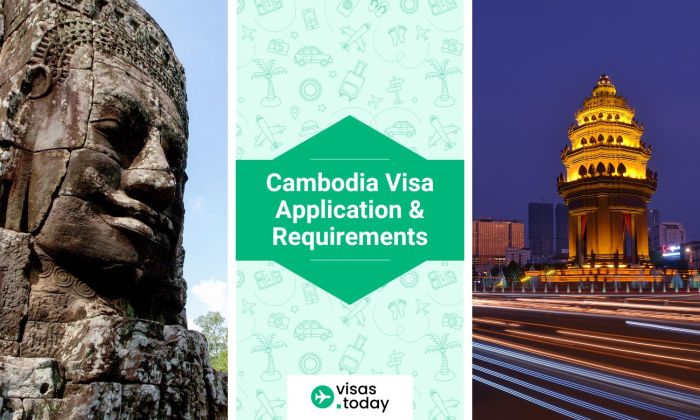
Navigating the world of visa requirements can be tricky, especially when it comes to the financial aspects. Understanding the fees associated with different visa types and the acceptable payment methods is crucial for a smooth application process. This section provides a clear overview of Cambodian visa costs and payment options.
Figuring out visa requirements for Cambodia can be tricky, but thankfully, resources like a first-time guide to South Dakota, can help you navigate similar travel planning challenges. first time guide to south dakota provides helpful insights into the process, and understanding visa procedures for one country can often translate to a better understanding of similar requirements elsewhere.
So, whether you’re planning a trip to South Dakota or Cambodia, researching the visa process beforehand is key.
Visa Fees for Different Visa Types
The cost of a Cambodian visa varies significantly based on the type of visa and the duration of stay. These fees are set by the Cambodian government and are subject to change. It’s essential to check the official website for the most up-to-date information before applying.
- Tourist Visas: The fee for a tourist visa typically ranges from a set amount for a single entry to a slightly higher amount for multiple entries. The length of stay and the specific visa category will determine the exact fee. For example, a 30-day single-entry tourist visa might cost USD 35, while a 90-day multiple-entry tourist visa might cost USD 60.
- Business Visas: Business visas often come with a higher fee structure, which reflects the more extended stay and the potential for economic activity. This can vary depending on the length of stay and the nature of the business. A typical 30-day business visa may cost USD 70, while a 90-day business visa might cost USD 120.
- Transit Visas: These visas are designed for short stays while passing through Cambodia. The fee for a transit visa is typically lower compared to other visa types, reflecting the limited stay and the lack of planned activity. For example, a 72-hour transit visa might cost USD 20.
- Other Visas: There are various other visa types, such as student, work, or investment visas. The fees for these types of visas can be quite different and will vary depending on the specific conditions. It’s crucial to research the particular requirements and costs of the specific visa type you need.
Payment Methods Accepted for Visa Applications
The Cambodian immigration authorities generally accept various payment methods for visa applications. This approach ensures flexibility and accessibility for applicants from different backgrounds.
- Cash: Some visa application centers may accept cash payments. However, this is not always the case, and it’s crucial to confirm with the specific application center. This method is less common now.
- Credit/Debit Cards: Visa and Mastercard are commonly accepted at many application centers, offering a convenient option for applicants. This is usually the most prevalent method for payments.
- Online Payment Platforms: Online payment gateways may also be available. This provides a secure and efficient way to pay for visa applications.
Additional Charges Associated with Visa Processing
Besides the visa fees, additional charges may be incurred during the visa application process. These charges are typically associated with service fees or courier charges.
- Service Charges: Some visa application centers may charge a service fee for handling the application process. This fee is usually clearly stated upfront and is often dependent on the specific application center.
- Courier Charges: If applying for a visa via a courier service, you may need to pay for courier fees. This is particularly applicable if you are applying from outside Cambodia. These charges will vary depending on the service provider and the destination.
Visa Fee Table
This table provides a summary of the typical visa fees and accepted payment methods. Note that these fees are approximate and may vary depending on the specific circumstances.
| Visa Type | Approximate Fee (USD) | Accepted Payment Methods |
|---|---|---|
| Tourist Visa (30 days) | 35 | Credit/Debit Cards, Online Payment |
| Business Visa (30 days) | 70 | Credit/Debit Cards, Online Payment |
| Transit Visa (72 hours) | 20 | Credit/Debit Cards, Online Payment |
| Student Visa | Variable | Credit/Debit Cards, Online Payment |
Visa Extensions and Renewals
Extending or renewing your Cambodian visa allows you to stay longer in the country beyond your initial visa’s validity period. Understanding the process is crucial for avoiding potential legal issues and ensuring a smooth stay. This section details the procedures, eligibility requirements, and necessary documents.
Eligibility Criteria for Extensions and Renewals
Eligibility for visa extensions or renewals is contingent upon several factors. The most important factor is maintaining legal status within the country, as authorities will scrutinize your compliance with immigration regulations. Valid reasons for extensions often include unforeseen circumstances or changes in travel plans. Additionally, the nature of your initial visa (tourist, business, etc.) can impact the eligibility criteria for extension or renewal.
It is essential to consult official Cambodian immigration guidelines to ensure full compliance.
Required Documents for Extensions
The specific documents required for a visa extension or renewal can vary based on your individual circumstances. A common set of documents often includes a completed application form, supporting documentation demonstrating the need for an extension, your original visa, passport copy, and proof of sufficient funds to cover your stay. The necessity for additional documents, such as medical certificates or employment contracts, depends on the reason for the extension.
Always check with the relevant authorities for the most up-to-date requirements.
- Passport, valid for at least six months beyond your intended stay.
- Original visa document.
- Proof of accommodation during the extended stay.
- Proof of financial resources (bank statements, sponsorship letters, etc.) to demonstrate your ability to support yourself during the extension period.
- A completed visa extension application form.
- Recent passport-sized photographs.
- Supporting documents to justify the reason for extension, such as a medical certificate, letter from your employer, or proof of a planned event.
Visa Extension Procedures
The visa extension procedure typically involves submitting an application to the designated immigration office. The process generally involves a fee, which must be paid according to the applicable regulations. The specific steps may vary based on the immigration office’s procedures and your circumstances.
- Application Submission: Submit the completed application form, required documents, and payment to the Cambodian immigration office.
- Review and Processing: The immigration office reviews the application and supporting documents to assess the validity of your request and your compliance with Cambodian immigration regulations.
- Decision and Approval: The immigration office issues a decision regarding the extension request. If approved, the new visa validity will be reflected on your existing visa or a new visa will be issued, depending on the specifics of the extension procedure.
- Collection of New Visa (if applicable): Collect the new visa document from the designated immigration office once the extension is processed. Ensure you keep a copy for your records.
Processing Time for Extensions
The processing time for visa extensions varies depending on several factors. It is often affected by the volume of applications, the completeness of the submitted documents, and the specifics of the case. Contact the Cambodian immigration authorities directly for the most up-to-date processing times. It’s crucial to allow sufficient time for processing to avoid potential delays and maintain your legal status in the country.
Processing times are often publicized on the official immigration website.
Flowchart of Visa Extension Process
The following flowchart illustrates the general steps involved in a visa extension process. Note that this is a simplified representation and may vary based on specific circumstances.
(Imagine a simple flowchart here. It would start with “Applicant submits application and documents” and then branch to “Application reviewed,” “Application approved,” and “Application denied.” Each branch would have further steps leading to either “New visa issued” or “Return of documents.” The flowchart would visually depict the process.)
Entry and Exit Requirements: Visa Requirements For Cambodia
Cambodia welcomes visitors with open arms, but adhering to entry and exit regulations is crucial for a smooth and legal stay. Understanding these rules ensures a positive experience and avoids potential complications. This section delves into the specifics of Cambodian entry and exit procedures, including staying within the country legally and the consequences of violating visa regulations.
Entry Procedures
Cambodia’s immigration authorities maintain stringent entry protocols. These procedures are designed to ensure the safety and security of the country while facilitating legitimate travel. Visitors must comply with all requirements to avoid delays or denial of entry.
- Passport Validity: A valid passport with at least six months of validity beyond the intended stay is typically required. This is a fundamental requirement for entry and should be verified before travel.
- Visa Requirements: The need for a visa depends on the nationality of the visitor and the duration of their stay. Cambodia has visa-free agreements with many countries. However, visitors from countries not on the visa-free list will need to obtain a visa before arrival or at a designated port of entry.
- Health Declarations: In some cases, health declarations may be required for visitors to ensure the health of the population and to prevent the spread of infectious diseases. These forms are often completed at the port of entry.
- Immigration Forms: Upon arrival, visitors may need to complete immigration forms providing details about their travel plans and personal information. These forms are often part of the entry process.
Exit Procedures
Leaving Cambodia involves similar procedures as entering. Careful attention to the regulations ensures a seamless departure.
- Passport Return: Your passport will be stamped upon exit. The stamp indicates the date and time of departure.
- Departure Tax (if applicable): Some countries may have a departure tax that needs to be paid at the airport. This tax is typically a small fee and is often included in the airline ticket cost.
- Compliance with Regulations: Visitors must ensure that they have not violated any Cambodian laws during their stay. Any unpaid fines or outstanding legal obligations will be addressed at the time of departure.
Staying Within the Country Legally, Visa requirements for cambodia
Staying legally in Cambodia requires adherence to several rules.
- Visa Adherence: Visitors must adhere to the terms of their visa, including the duration of stay and permitted activities. Overstaying a visa is a serious offense.
- Respect for Local Laws: Visitors are expected to respect Cambodian laws and regulations. This includes adhering to traffic laws, observing cultural norms, and avoiding any activities that may disrupt public order.
- Proper Documentation: Visitors must possess all necessary documentation, including their passport and visa, during their stay. This is crucial for interaction with authorities and ensures that visitors are abiding by the law.
Penalties for Violating Visa Regulations
Violating Cambodian visa regulations can lead to penalties.
- Fines: Failure to comply with visa regulations can result in fines, which vary in amount and are determined by the severity of the violation.
- Deportation: Severe violations, such as overstaying a visa or engaging in illegal activities, can lead to deportation. This means being required to leave the country immediately.
- Legal Proceedings: More serious violations may result in legal proceedings, which can have significant consequences for the visitor.
Common Entry and Exit Regulations
- Valid Passport: A passport with sufficient validity beyond the intended stay is mandatory.
- Required Visas: Certain nationalities require visas, which must be obtained in advance or upon arrival at the port of entry.
- Immigration Forms: Completing and submitting immigration forms upon arrival is part of the standard procedure.
- Health Declarations: Depending on the circumstances, visitors may need to complete health declarations to protect public health.
- Departure Tax (if applicable): Some countries may impose a departure tax, payable at the airport.
- Compliance with Laws: Visitors must respect Cambodian laws and regulations during their stay and departure.
Specific Visa Types (Elaboration)
Navigating Cambodia’s visa landscape can be tricky, but understanding the specific requirements for different visa types makes the process much smoother. This section dives into the details of business, work, and student visas, providing clear explanations and necessary document lists. Knowing the precise documentation and procedures will help you apply confidently and avoid delays.
Business Visa
A business visa allows individuals to enter Cambodia for business-related activities. The exact requirements and procedures vary based on the nature of the business activity and the applicant’s nationality. A business visa typically requires a formal invitation letter from a Cambodian business entity.
- Invitation Letter: A crucial document issued by a Cambodian company, outlining the purpose and duration of the visit. It often includes details of the business activities planned.
- Proof of Business Relationship: Documents demonstrating the applicant’s relationship with the Cambodian company, such as contracts, letters of agreement, or previous business dealings.
- Financial Documents: Evidence of sufficient funds to cover the applicant’s expenses during their stay in Cambodia. This might include bank statements, travel insurance, or a letter of support from a sponsor.
- Passport: Valid passport with sufficient validity beyond the intended stay.
Work Visa
A work visa is essential for individuals seeking employment in Cambodia. The process typically involves a Cambodian employer sponsoring the application. The employer will usually handle most of the bureaucratic aspects.
| Requirement | Details |
|---|---|
| Employment Contract | A legally binding agreement outlining the terms and conditions of employment, including salary, responsibilities, and duration. |
| Work Permit | Issued by the Cambodian authorities, confirming the applicant’s permission to work in the country. This permit is often obtained through the employer. |
| Proof of Qualifications | Relevant certificates, degrees, or licenses demonstrating the applicant’s expertise in their field. |
| Passport | A valid passport with sufficient validity beyond the intended stay. |
Student Visa
A student visa is for individuals enrolling in Cambodian educational institutions. The specific requirements depend on the chosen educational institution. It’s crucial to check the eligibility criteria and requirements with the specific university.
- Acceptance Letter from Educational Institution: Official confirmation of admission from the Cambodian university or college. This is a critical document and usually includes details of the course, duration, and enrollment status.
- Financial Documents: Demonstrating sufficient funds to cover tuition fees, living expenses, and travel during the study period. Bank statements or financial sponsorship letters might be required.
- Passport: Valid passport with sufficient validity beyond the intended stay.
- Proof of Enrollment: A formal document from the university that confirms the applicant’s enrollment.
Troubleshooting Common Issues
Navigating the Cambodian visa application process can sometimes be tricky. This section addresses common problems applicants encounter, offering solutions and strategies to overcome potential obstacles and avoid delays or rejections. Understanding these potential pitfalls can significantly improve your chances of a successful application.Many visa applications get bogged down in procedural errors or misunderstandings. By understanding these common snags and their solutions, you can streamline the process and avoid unnecessary stress and delays.
Careful attention to detail and proactive problem-solving are key to securing your Cambodian visa.
Common Application Errors
Understanding potential errors in your visa application is crucial for a smooth process. Inaccuracies in personal information, incomplete documentation, or failure to meet specific requirements can all lead to delays or rejection. Accuracy and completeness are paramount.
- Incorrect Information:
- Missing Documents:
- Incomplete Application Forms:
Providing inaccurate information, such as a misspelled name or incorrect date of birth, is a common cause of application issues. Double-check all details meticulously before submitting the application. Using official documents as references for accuracy, such as a passport or birth certificate, helps to minimize errors. This ensures the application matches your official identity documents.
Getting a Cambodian visa can be a bit of a headache, but thankfully, it’s not as complicated as some other destinations. You’ll want to check the specific requirements, but generally, it’s pretty straightforward. Speaking of straightforward travel, if you’re planning a trip to Cairo on a budget, cairo on a budget is a great resource. It’s packed with tips and tricks for saving money while exploring the ancient wonders.
Ultimately, researching visa requirements is crucial before any trip, especially if you’re travelling to Cambodia, so don’t skip that step!
A critical aspect of a successful application is ensuring all required documents are included. A missing document can halt the process. Carefully review the official list of requirements and ensure each item is present and correctly formatted. Maintaining an organized checklist helps track the documents needed.
An incomplete application form can lead to rejection. Thoroughly complete all sections of the application form, ensuring all fields are filled accurately and completely. Following the instructions carefully, as Artikeld in the application guidelines, is crucial for a successful submission.
Resolving Application Delays
Delays in visa processing can stem from various factors, including administrative issues or backlogs. Understanding these potential reasons and how to address them can significantly reduce the wait time.
- Tracking Application Status:
- Communicating with the Embassy/Consulate:
- Addressing Missing Documentation:
Actively monitoring the status of your application through the official channels is essential. Regularly checking for updates provides insight into the processing stage. Maintaining communication with the relevant authorities is crucial to stay informed about potential delays.
Planning a trip to Cambodia? Visa requirements can be a bit tricky, but thankfully, they’re usually straightforward. While you’re researching visa policies, you might also be interested in the BTS reality show’s Airbnb house, bts reality show airbnb house , which offers a unique perspective on the culture. No matter your travel plans, remember to check the latest visa requirements for Cambodia before you go.
If delays occur, contact the Cambodian embassy or consulate. Clearly explain the situation and request an update on the application’s progress. Communicating promptly and professionally can help expedite the process.
If requested, immediately provide any missing documents. Promptly responding to any requests can minimize delays and ensure a smoother processing. Ensuring all requested documents are sent as soon as possible prevents unnecessary delays.
Resolving Visa Rejection
Visa rejection can be frustrating, but understanding the reasons for the rejection is vital to addressing the issue.
- Reviewing Rejection Letter:
- Addressing Deficiencies:
- Consulting with an Expert:
Carefully review the rejection letter for specific reasons. This helps identify the areas needing improvement. The rejection letter usually explains the specific cause, allowing for informed action.
If the rejection was due to missing or incorrect information, promptly address the issues by providing the necessary documentation or corrections. Addressing the specific points raised in the rejection letter is key to resubmitting a successful application.
If you are unsure about the reasons for rejection, consider consulting with a legal professional specializing in visa matters. This can provide valuable insights into rectifying the issues.
Frequently Asked Questions (FAQ)
| Question | Answer |
|---|---|
| What is the average processing time for a Cambodian visa? | Processing times vary depending on the visa type and the specific application. Official websites provide estimated timelines. Real-world examples demonstrate the range of processing times. |
| Can I expedite my visa application? | Certain visa types may have expedited processing options. Checking the embassy or consulate’s website provides details on potential expediting options. |
| What should I do if I lose my visa application documents? | Contact the relevant authorities immediately to report the loss and follow their procedures for replacement. Official procedures for lost documents should be followed to avoid further complications. |
Resources and Contact Information
Navigating the intricacies of Cambodian visa requirements can feel overwhelming. Fortunately, numerous resources are available to simplify the process and provide crucial information. Knowing where to find accurate and up-to-date details is key to a smooth application journey.
Essential Websites for Visa Information
Finding the right information online is crucial for a successful visa application. Reliable websites provide detailed instructions and the most current regulations.
- Cambodian Ministry of Foreign Affairs, International Cooperation and Culture Website: This official website is an excellent starting point. It often contains the most current and precise information on visa policies, including any recent changes. Be sure to check the “Consular Services” section for specific details.
- Embassy/Consulate Websites: Each Cambodian embassy or consulate in your home country will have a dedicated website. These websites offer valuable information specific to that location, including application procedures, required documents, and contact details.
- Visa Application Portals: Some countries may have online portals or platforms for visa applications. These portals can simplify the process by providing an online form and tracking system for your application.
- Independent Travel and Visa Resources: Numerous travel blogs and websites offer insightful information about visa requirements, particularly for independent travelers. These resources often include personal experiences and tips from travelers who have recently navigated the visa process.
Contact Information for Cambodian Embassies/Consulates
Direct contact with the relevant Cambodian embassy or consulate is often the fastest way to address specific questions or concerns. This is particularly helpful for resolving application issues.
- Locate the Relevant Embassy/Consulate: Start by researching the nearest Cambodian embassy or consulate to your location. Their contact information is often available on their website or through online search engines.
- Contact Information: Most embassy/consulate websites list contact details, including email addresses, phone numbers, and physical addresses. Using these details, you can directly contact the appropriate embassy/consulate to ask specific questions about the visa process.
Additional Helpful Resources
Supplementing official resources with additional information can provide a comprehensive understanding of the visa requirements.
- Online Forums and Communities: Online travel forums and communities are valuable for seeking advice from fellow travelers who have previously obtained Cambodian visas. They can offer insights into specific challenges and provide helpful tips for successful applications.
- Visa Service Providers: If you prefer to outsource the application process, consider contacting visa service providers. These providers specialize in handling visa applications, which can streamline the process and save you time.
- Travel Agencies: Some travel agencies offer comprehensive travel packages that include visa assistance. These agencies can be a useful resource, especially for those unfamiliar with the process.
Ultimate Conclusion
In conclusion, securing the correct Cambodian visa is vital for a seamless journey. This guide has thoroughly examined the requirements, from initial application to potential extensions. By understanding the diverse visa types, necessary documents, and processing times, you can proactively address any potential challenges and ensure a smooth entry and stay in Cambodia. Remember to always verify the most up-to-date information directly from the Cambodian government sources.
